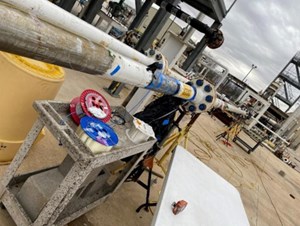NETL demonstrates new pipeline sensor technologies in a pilot-scale field test
NETL’s pipeline sensor team recently completed successful field tests of an extensive new collection of fiber optic sensor and surface acoustic wave sensor technologies for natural gas pipeline monitoring that can help ensure safer and more secure natural gas pipeline delivery and mitigate greenhouse gas (GHG) methane emissions.

According to the U.S. Energy Information Agency, the United States’ natural gas pipeline network can transport natural gas to and from nearly any location in the lower 48 states and consists of more than 210 gas pipeline systems and 400 underground natural gas storage facilities. The pipeline network has about 3 million miles of mainline and other pipelines that link natural gas production areas and storage facilities with consumers. In 2021, this natural gas transportation network delivered about 27.6 trillion cubic feet of natural gas to about 77.7 million consumers.
Pipeline transport is safer, more efficient, and creates fewer GHG emissions than ship, truck or train, but more effective ways to detect potential leaks of GHG and other issues is an ongoing need.
NETL researchers have been developing better ways to ensure the safety of the pipeline network and to mitigate methane leaks using fiber optic sensor technologies and surface acoustic wave sensors. To increase the technology readiness level, the pipeline sensor team has focused on packaging the sensors and conducting field test validations in support of Natural Gas Infrastructure FWP. The most recent testing of the new technologies occurred in mid-February 2023 at the Southwest Research Institute (SwRI) test facility.
NETL’s Ruishu Wright, who served as principal investigator on the project, explained that in the most recent test, fiber optic sensors and surface acoustic wave sensors were installed outside and inside the natural gas flowing multi-phase pipe test facility at SwRI. The test successfully monitored gas flow and leaks, internal water and corrosion, and pipeline conditions such as pressures and temperature changes.
The distributed fiber optic interrogation technology enables continuous, real-time measurements along the entire length of a fiber optic cable. The optical interrogator system connects to an optical fiber cable and injects laser energy in the form of short pulses into the fiber, converting it to an array of distributed sensors. The real-time data pinpoints the precise location of events and conditions occurring at or near the fiber sensor cable.
Optical fiber sensors offer advantages over other types of sensors because they are small, lightweight, can endure high temperatures and pressures, and are immune to electromagnetic interference. In addition, the optical fiber sensors feature long reach and spatially distributed monitoring. The sensors use backscattered light interrogators that were built at NETL.
“The testing successfully demonstrated that optical fiber-based distributed acoustic sensing, distributed strain sensing, and distributed temperature sensing are effective monitoring tools for making pipelines safer,” Wright said. “These technologies can help operators learn about the precise location of potential pipeline safety threats and give the operator the opportunity to make timely and proportionate responses.”
In addition to the NETL-built distributed fiber optic interrogators, functional materials are also integrated onto the fiber optic-based sensors that enable corrosion and methane gas monitoring. Enabling the sensor devices to sense chemicals and gases is a unique capability of NETL.
This field test, conducted at SwRI’s Texas facility, is the second major field test of a multi-year research and development plan for pipeline sensor technology maturation.
NETL’s pipeline sensor team members who attended the field test included: Nathan Diemler, Nageswara Lalam, Matthew Brister, Alexander Shumski, Jagannath Devkota, Richard Pingree, and Khurram Naeem of the University of Pittsburgh.
Related News
Related News

- Woodfibre LNG receives BCEAO order to move floatel to site to house non-local workforce
- QatarEnergy, Exxon seek to remove contractor from Texas gas project
- Veolia, Waga Energy and ENGIE collaborate to develop renewable natural gas industry in France
- Congo Brazzaville becomes an LNG exporting country
- Fulcrum LNG to pair with McDermott, Baker Hughes for Guyana gas project
- EU approves law to hit gas imports with methane emissions limit
- Veolia, Waga Energy and ENGIE collaborate to develop renewable natural gas industry in France
- Hawai'i Gas selects Eurus Energy America, Bana Pacific for hydrogen and renewable natural gas projects
- TotalEnergies increases LNG deliveries to Asia with two new contracts
- Desert Mountain Energy Corp. initiates helium production



Comments